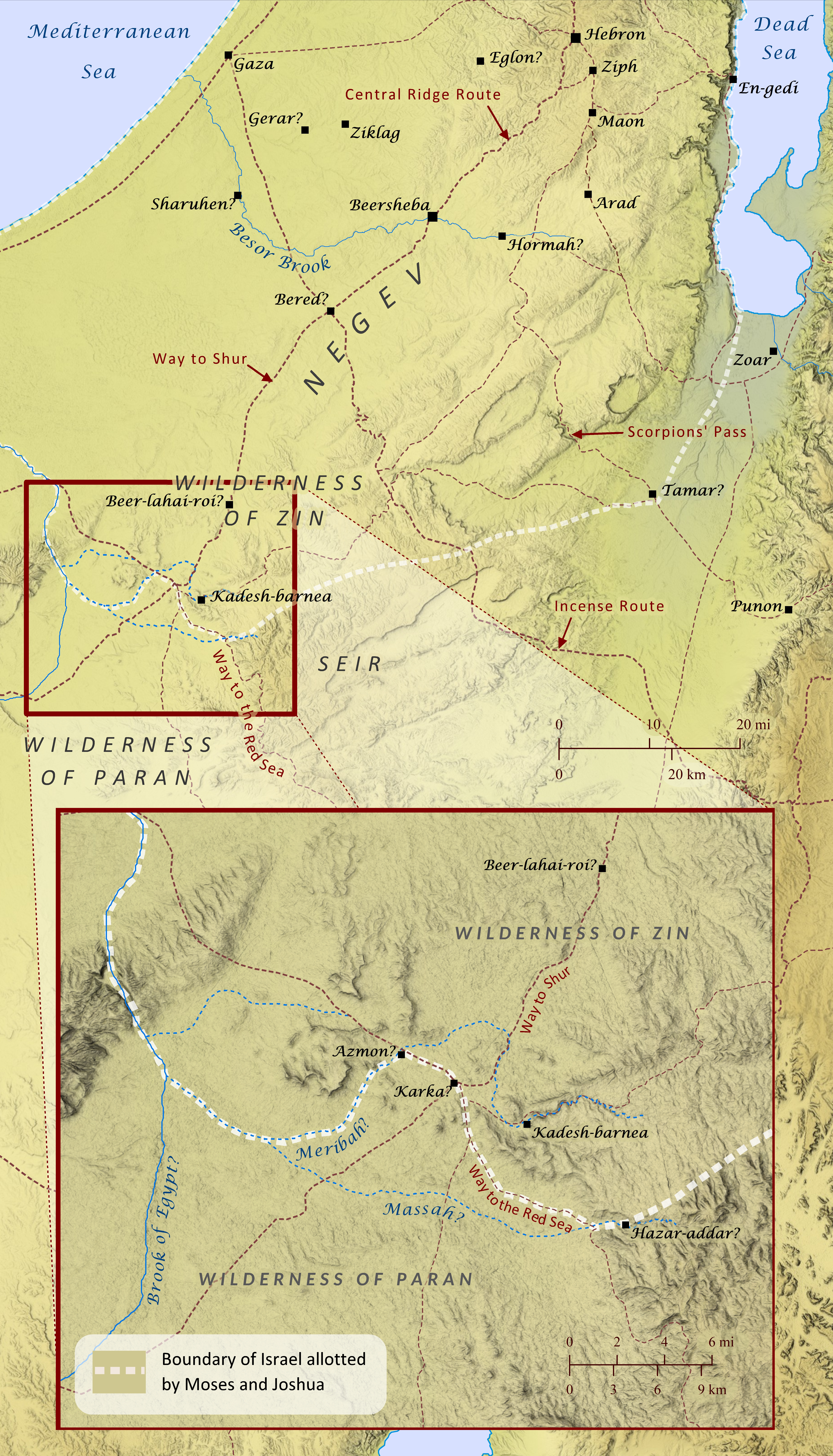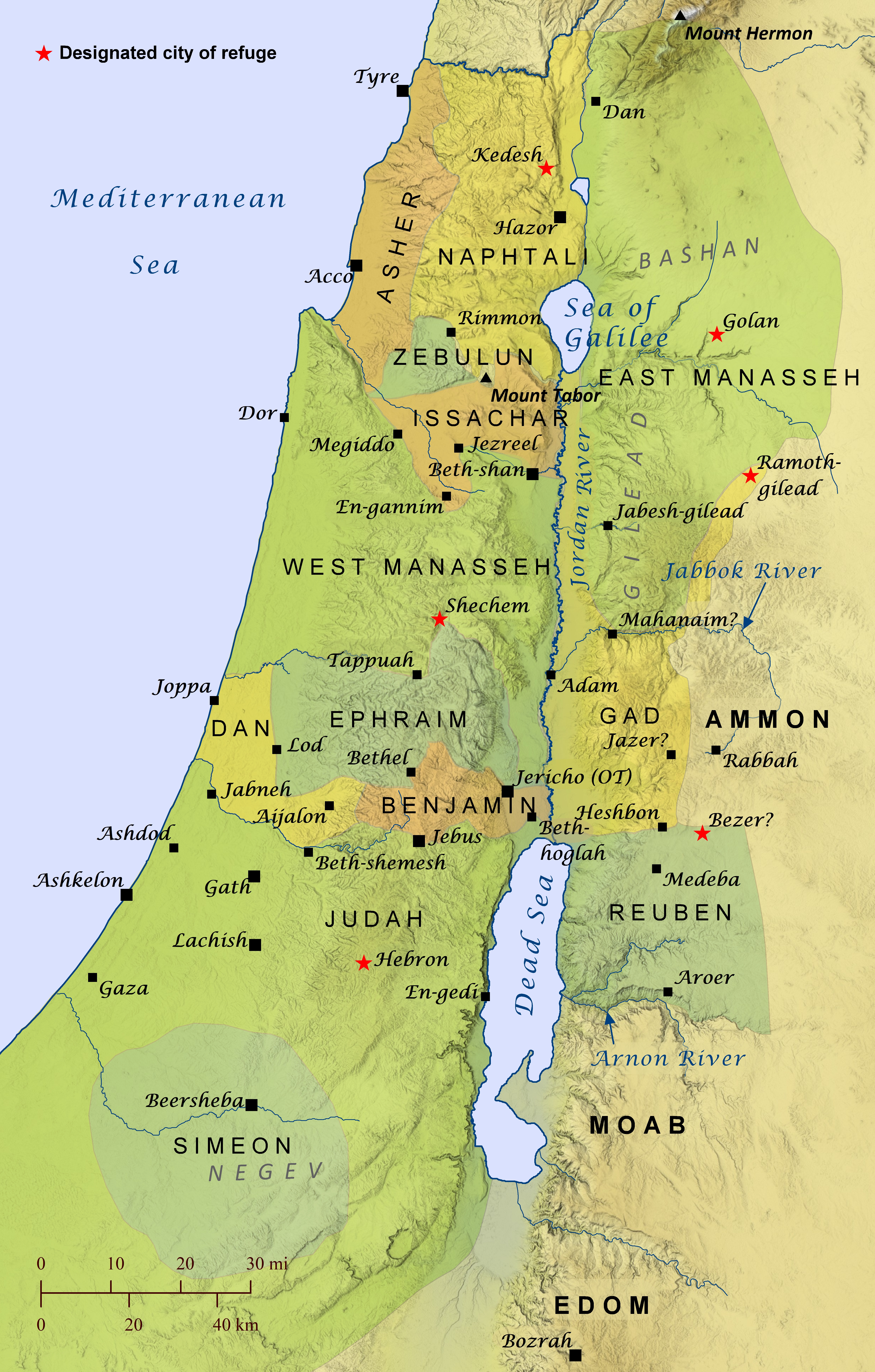Readers’ Version
Literal Version
14 These are what the Israelis inherited in the land of Canaan, which Eleazar the priest and Yehoshua (Nun’s son) and the leaders of the Israelis gave them as an inheritance. 2 Their allocations were made by casting lots for the nine and a half tribes, just as Yahweh had commanded through Mosheh.[ref] 3 (Mosheh had given the other two and a half tribes their inheritance on the other side of the river, but the Levites weren’t given land as an inheritance[ref]—4 instead of land they were given cities to live in, along with the surrounding fields for their livestock. Yosef’s two sons Menashsheh and Efrayim were considered as two tribes.) 5 The Israelis did just as Yahweh had commanded Mosheh—they allocated blocks of the land as permanent possessions.
6 Leaders from the tribe of Yehudah approached Yehoshua at Gilgal and Caleb (son of Yefunneh the Kenizzite) said to him, “You yourself know what Yahweh told the man of God Mosheh at Kadesh-Barnea about me and you.[ref] 7 I was forty years old when Yahweh’s servant Mosheh sent me from Kadesh-Barnea to spy out the land, and I brought back an honest report.[ref] 8 The other men who went made the people terrified, but I remained loyal to my god Yahweh. 9 Mosheh promised me that day, saying, ‘The land that you walked on will certainly be for an inheritance for you and your sons forever, because you were completely loyal to my god Yahweh.’[ref] 10 Now, listen. Yahweh has kept me alive these forty-five years since Yahweh said that to Mosheh, back when Yisrael was walking in the wilderness. Yes, believe it or not, I’m now eighty-five. 11 I’m still as strong today as I was on the day that Mosheh sent me. Just like I could fight back then, I can still fight or travel just the same. 12 So now, please give me that hill country that Yahweh promised that day, because you yourself heard me say that the Anakim lived there in fortified cities. So now, perhaps Yahweh will help me to take them over just as he said.”
13 So Yehoshua blessed Yefunneh’s son Caleb and gave him Hebron as his inheritance. 14 Because of that, Hebron belongs to Caleb (Yefunneh the Kenizzite’s son) as an inheritance until this day, because he was completely loyal to Yisrael’s god Yahweh. 15 (Hebron used to be called Kiriat-Arba—Arba had been a brave warrior among the Anakim.)
Then there was a time of no more war in that region.
2 In/on/at/with_lot_of inheritance_of_their just_as he_had_commanded YHWH in/on/at/with_hand_of Mosheh for_nine_of the_tribes and_one-half_of the_tribes.
3 If/because Mosheh he_had_given the_inheritance_of the_two_of the_tribes and_one-half_of the_tribes on_east of_the_Yardēn and_to_the_Lēviyyiy not he_had_given an_inheritance in/on/at/with_among_of_them.
4 If/because the_descendants_of they_were of_Yōşēf/(Joseph) two_of tribes Mənashsheh and_ʼEfrayim and_not people_gave a_portion to_the_Lēviyyiy on_the_earth if/because (if) cities to_live and_pasture_lands_of_their for_flocks_of_their and_for_herds_of_their.
5 Just_as YHWH he_had_commanded DOM Mosheh so the_people_of they_did of_Yisrāʼēl/(Israel) and_divided DOM the_earth/land.
6 and_ the_descendants_of _came of_Yəhūdāh/(Judah) to Yəhōshūˊa in/on/at/with_Gilgāl and_he/it_said to_him/it Kālēⱱ/(Caleb) the_son_of Yəfunneh/(Jephunneh) the_Kenizzite you you_know DOM the_message which he_spoke YHWH to Mosheh the_man_of the_ʼElohīm on concerning_of_me and_about because_of_you in/on/at/with_Qādēsh- barnēˊa.
7 was_a_son_of forty year[s] I in/on/at/with_sent Mosheh the_servant_of YHWH DOM_me from_Qādēsh- barnēˊa to_spy_out DOM the_earth/land and_brought_back DOM_him/it a_message just_as with heart_of_my.
8 And_brothers_of_my who they_went_up with_me they_melted DOM the_heart_of the_people and_I I_filled after YHWH god_of_my.
9 And_ Mosheh _swore in_the_day (the)_that to_say if not the_earth/land which it_trod foot_of_your in/on/at/with_her to/for_yourself(m) it_will_belong as_inheritance and_of_children_of_your until perpetuity if/because you_filled after YHWH god_of_my.
10 And_now here he_has_let_live YHWH DOM_me just_as he_spoke this forty and_five year[s] from_time he_spoke YHWH DOM the_message the_this to Mosheh when it_walked Yisrāʼēl/(Israel) in/on/at/with_wilderness and_now here I the_day am_a_son_of five and_eighty year[s].
11 Still_I the_day am_strong just_as in/on_day sent DOM_me Mosheh as_strength_of_my then and_as_strength_of_my now for_the_war and_for_going and_to_coming.
12 And_now give to/for_me DOM the_hill_country the_this which he_spoke YHWH in_the_day (the)_that if/because you you_heard in/on/at/with_day (the)_that if/because_that ˊAnāqī were_there and_cities large fortified perhaps YHWH with_me and_drive_out_them just_as he_spoke YHWH.
13 And_blessed_him Yəhōshūˊa/(Joshua) and_he/it_gave DOM Ḩeⱱrōn to_Kālēⱱ/(Caleb) the_son_of Yəfunneh/(Jephunneh) as_inheritance.
14 On/upon/above/on_account_of//he/it_went_in yes/correct/thus/so it_belonged Ḩeⱱrōn of_Kālēⱱ the_son_of Yəfunneh the_Kenizzite as_inheritance until the_day the_this because that he_filled after YHWH the_god_of Yisrāʼēl/(Israel).
15 And_name_of Ḩeⱱrōn to/for_before was_Qiryat ʼArbaˊ the_humankind the_greatest in/on/at/with_ˊAnāqī he and_the_earth it_was_at_peace from_war.


